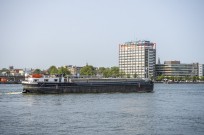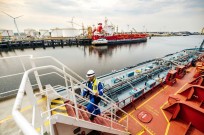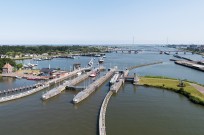Recent years have shown that climate change also has its effects on inland shipping. Both high and low tides can disrupt inland navigation. Effects can include not being able to sail in January because the Oranjesluis was blocked, or sailing with less cargo per ship.
-

Departing car carriers with a length of more than 180 m which leave stern first from the Westhaven must have a second pilot on board.
This Decree will come into force on 9 June 2024.
With effect from 9 June 2024, a second pilot will be required on board the following seagoing ships:
Departing car carriers with length over all greater than 180 m leaving the Westhaven stern first.
As the world’s largest gasoline port, Amsterdam is a leading player in the oil energy market. Port of Amsterdam has excellent sea and hinterland connections.
This permit relates exclusively to the bunkering of liquefied methane to another ship from the Alice Cosulich, or any other vessel from Fratelli Cosulich Shipmanagement Srl that is registered by the applicant and approved by the Director of the Central Nautical Management North Sea Canal Area, that is capable for liquefied methane.
-

The Port of Amsterdam’s annual report published today shows that the port is in transition. While revenues rose to €190.4 million, transhipment fell to 63 million tonnes. This is mainly due to a decline in fossil fuel transhipment.
-

The Oranjesluizen complex near Amsterdam has been closed since Wednesday at 19:00, due to the water levels in the Markermeer. The Noorder, Midden and Zuidersluis and, the Prins Willem Alexandersluis, are expected to remain out of operation until Thursday, January 11.
Due to a shallow patch at km 20 (east of the Coentunnel), the Director of the Central Nautical Management has set temporary draught restrictions for ships with dimensions (L*B) of 90*45 m (Capesize) and 235*33 m (Panamax) that have to pass km 20.